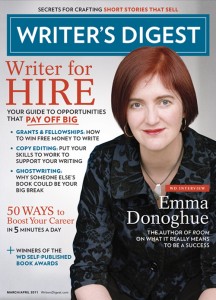 I noticed last night that the last article I wrote for Writer’s Digest, “Elements of a Successful Fiction Platform” is now online. Hooray!
I noticed last night that the last article I wrote for Writer’s Digest, “Elements of a Successful Fiction Platform” is now online. Hooray!
I think fiction writers, memoir writers, and children’s writers have it rough, and I want to acknowledge their unique challenges. This is partly what motivated me to pitch and write this article for Writer’s Digest.
I wanted to get to the bottom of the whole, “But Christina, I’m a fiction (memoir, children’s…) writer, so your platform advice does not apply to me, although it’s nice for you and your tribe of lagabout nonfiction writers.”
I was never really convinced that the advice in Get Known did not apply to writers of other genres, but I was willing to go straight to the top, in this case interviewing 13 powerhouse novelists, to find out what they collectively know about fiction platforms.
I interviewed James Scott Bell, Meg Cabot, Gwyn Cready, Katie Davis, Hallie Ephron, Heather Vogel Frederick, J. A. Konrath, Lisa McMann, Scott Sigler, Laurel Snyder, Dana Stabenow, Susan May Warren, and Allison Winn Scotch.
And they all rock, by the way.
And guess what they said?
They said platform is incredibly important.
Not a single one of them said platform wasn’t important. Nobody wanted to impress upon me how different it is for them as novelists than it is for nonfiction writers. And all of them accepted that self-promotion comes part and parcel with the job description.
So, we’re all in the same boat, folks. And I think it’s time to get over it.
No willingness to self-promote, no book sales.
Traditionally published or self-published, it does not matter. With extremely rare exception, like almost never, platform rules.
Of course, the writing has to be exceptional, as well. Never forget that part. They all agreed on this.
I know it, best-selling fiction writers know it, everybody, by now, I hope, knows it.
If you are someone who still wants to argue about whether or not other types of writers besides strictly nonfiction writers need a platform, you can try, but as far as I’m concerned the case is closed.
If you want your hard work to get read, you’ll come around. And if you don’t want to come around, then consider writing for personal pleasure, rather than as a professional writer.
Platform development is not simple — it won’t happen at lightning speed and at your convenience. It takes years to establish and maintain a solid platform.

But if you embrace the platform-building process as part of your job description, you will get used to it, and you might even have fun with it. I do and I definitely got the sense that all of the authors I interviewed totally get platform, are at peace with it, and enjoy the opportunity to connect with their readers.
And amen to that.
If you are just getting starting or you could use a basic primer on platform development and how it fits into a writer’s career, take a look at my book, Get Known Before the Book Deal (LINK).
If you have already identified your audiences, determined your niche, and built an online platform that reaches out to your current and potential readership, and you want to take it to the next level, take a look at my more recent article in the current, but soon to fade from stands, March/April issue of Writer’s Digest, “50 Simple Ways To Build Your Platform In Five Minutes A Day.”
One final piece of platform advice: put your name, face, and considerable writing expertise at the center of your platform and spoke off exciting and engaging social artistry from there. Keep this simple, so it stays manageable as you devote the lion’s share of your energy to your craft.
If your platform is so over the top that it strains you and interferes with getting your best writing done, then maybe you are allowing platform to be too complicated. If you can’t sustain the time and energy to nurture your craft and put your very best work out in the world, then there’s no point. Get your priorities straight and everything will fall back in place.
Writers serve readers. It’s fun and rewarding work. So go do it and then let me know how it went. And for goodness sake, don’t let me catch you grousing.
